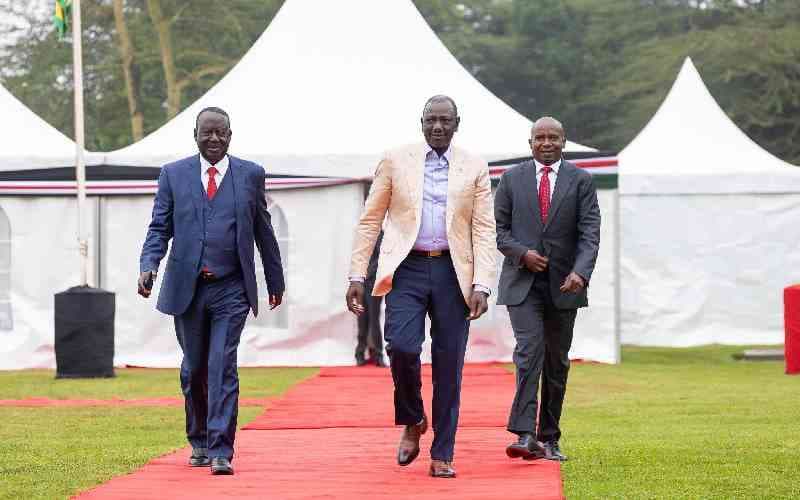We're loading the full news article for you. This includes the article content, images, author information, and related articles.
The Majority Leader's admission confirms that the Kenya Kwanza government initiated dialogue following intense pressure from the opposition's deadly and economically disruptive cost-of-living demonstrations.

NAIROBI - National Assembly Majority Leader Kimani Ichung’wah has revealed that high-level discussions between the government and opposition leader Raila Odinga’s coalition began in 2023, at the peak of violent anti-government protests that rocked the nation. The statement reframes the official narrative around the formation of the National Dialogue Committee (NADCO), suggesting the talks were a direct consequence of the civil unrest rather than a purely voluntary political process.
The protests, dubbed the 'Unga Revolution', were spearheaded by Mr. Odinga's Azimio la Umoja One Kenya Coalition and took place in several waves between March and July 2023. The demonstrations were primarily fueled by public anger over the high cost of living, exacerbated by the passage of the controversial Finance Act, 2023, which introduced new taxes, including doubling the VAT on petroleum products from 8% to 16%. Protesters demanded the repeal of the act and measures to lower the price of essential commodities.
Initially, President William Ruto’s administration took a hardline stance, with senior officials vowing not to engage with the opposition and labeling the protests as illegal and economically destructive. The demonstrations frequently descended into chaos, leading to significant loss of life, injuries, and widespread destruction of property. According to the Independent Policing Oversight Authority (IPOA), at least 57 Kenyans were killed during the protests between March and July 2023. Human rights organizations also documented numerous cases of excessive force by police. The economic toll was substantial, with the Kenya Private Sector Alliance (KEPSA) estimating daily losses of up to KSh 3 billion during the demonstrations. Nairobi County alone reported losing nearly half its daily revenue on protest days.
Mr. Ichung'wah's recent admission confirms that the unrelenting pressure forced a political rethink within the government. The sustained protests ultimately led to the establishment of the 10-member National Dialogue Committee (NADCO), co-chaired by Ichung'wah for the Kenya Kwanza coalition and Kalonzo Musyoka for Azimio. The committee was mandated to address five key areas: electoral justice, cost of living, fidelity to political parties, entrenchment of various government funds, and the establishment of state offices, including that of the Official Leader of the Opposition.
The committee tabled its final report in Parliament on December 7, 2023, and it was formally adopted by the National Assembly in February 2024. Key recommendations included the audit of the 2022 electoral process, restructuring the IEBC selection panel, and constitutional amendments to create the offices of the Prime Minister and the Leader of the Official Opposition. On the contentious issue of the cost of living, NADCO failed to reach a consensus on scrapping the housing levy or reducing VAT on fuel, but did recommend a 50% cut in travel budgets for all arms of government.
The implementation of the NADCO report has been a slow and contested process. While several bills were drafted to enact the recommendations, progress has been hampered by political disagreements and legal challenges. In April 2024, the High Court temporarily suspended the implementation of the report following a petition, sparking further political turbulence. However, a joint five-member committee, co-chaired by Senator Agnes Zani, was established in August 2025 to oversee the rollout of the NADCO recommendations and a broader ten-point agenda agreed upon by President Ruto and Mr. Odinga.
Mr. Ichung'wah's revelation that talks began under duress in 2023 provides crucial context to the current political landscape. It validates the opposition's long-standing argument that civil protest was the only language the government would understand. It also raises questions about the government's commitment to the dialogue's outcomes, with some Azimio members, like Eugene Wamalwa, having refused to sign the final report, citing a lack of good faith from the government side on the cost-of-living issue. As the implementation committee begins its public engagement, the focus for many Kenyans will be whether the political settlement born from street battles will translate into tangible relief and lasting institutional reform.
Keep the conversation in one place—threads here stay linked to the story and in the forums.
Sign in to start a discussion
Start a conversation about this story and keep it linked here.
Other hot threads
E-sports and Gaming Community in Kenya
Active 9 months ago
The Role of Technology in Modern Agriculture (AgriTech)
Active 9 months ago
Popular Recreational Activities Across Counties
Active 9 months ago
Investing in Youth Sports Development Programs
Active 9 months ago
Key figures and persons of interest featured in this article